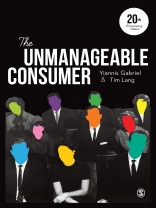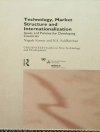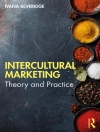‘The Unmanageable Consumer has long been one of my favorite books in the sociology of consumption. This long overdue third edition has updated and revised the basic argument in many ways. Most importantly, it now offers a new chapter on the consumer as worker or, more generally, the prosumer. Assign it to your classes (I have…and will again) and read it for your edification.’ – George Ritzer, Distinguished University Professor, University of Maryland, USA
Western-style consumerism is often presented as unstoppable, yet its costs mount and its grip on consumer reality weakens. In this 20th Anniversary edition, Gabriel and Lang restate their thesis that consumerism is more fragile and unmanageable than is assumed by its proponents.
Consumerism has been both stretched and undermined by globalization, the internet, social media and other cultural changes. Major environmental threats, debt, squeezed incomes and social inequalities now temper Western consumers′ appetite for spending. The 20th century Deal, first championed by Henry Ford, of more consumption from higher waged work looks tattered.
This edition of The Unmanageable Consumer continues to explore 10 different consumer models, and encourages analysis of contemporary consumerism. It looks at the spread of consumerism to developing countries like India and China and considers the effects of demographic changes and migration, and points to new features such as consumers taking on unwaged work.
New to this edition:
- Coverage of new phenomenon such as social media and emerging markets
- Explores contemporary topics including the occupy movement and horsemeat scandal
- A new chapter on the consumer as worker.
′This is a remarkable and important book. The new edition updates consumer cultural studies to take into account austerity politics and the economic crisis, and the impact these have had on how we think about and experience everyday practices of shopping and consuming. The authors also build on and maintain the lively and challenging argument from the previous volumes which sees the consumer as an unstable space for a multiplicity of often contradictory responses which can unsettle the various strategies on the part of contemporary capitalism to have us buy more.′ – Angela Mc Robbie, Goldsmiths, University of London
‘The book exemplifies how social science should be: engaged, insightful, imaginative, scholarly and highly socially and politically relevant. Strongly recommended to students, academics as well as all people interested in understanding our time and themselves in an age of consumerism and false promises.’ – Mats Alvesson, Professor of Business Administration, Lund University, Sweden
Tabla de materias
The Emergence Of Contemporary Consumerism
The Consumer As Chooser
The Consumer As Communicator
The Consumer As Explorer
The Consumer As Identity-Seeker
The Consumer As Hedonist
The Consumer As Victim
The Consumer As Rebel
The Consumer As Activist
The Consumer As Citizen
The Consumer As Worker
The Unmanageable Consumer
Sobre el autor
Tim Lang has been Professor of Food Policy at City University′s Centre for Food Policy since 2002. With a Ph D in Social Psychology from Leeds University he became a hill farmer in Lancashire, North of England, in the 1970s. Over the last four decades he has engaged in public and academic research and debate about food policy: what sort of food system do we want? What do we mean by progress? He has written and co-written 10 books and many reports and papers on the trends, problems and policy frameworks in the food system. A constant theme is how public health, environment, social justice and consumer rights do and don’t connect. Besides his academic work, he has been an advisor to many bodies including the World Health Organisation, the EU Environment Commissioner, the Mayor of London and many civil society organisations. He was the UK Government’s Sustainable Development Commissioner for food and land use in 2006-11. All this enquiry and engagement spawned and retains his keen interest in the issues analysed in The Unmanageable Consumer.












